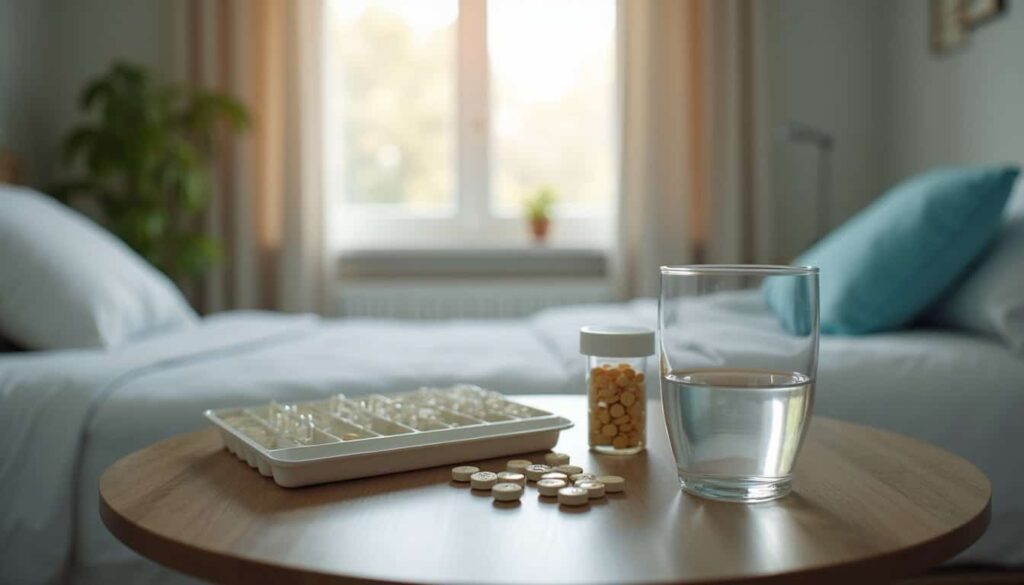To overcome health anxiety during addiction recovery, you’ll need to recognize that 97% of individuals with substance use disorders experience anxiety symptoms, often amplified by neurochemical changes during withdrawal. Build a dual-diagnosis treatment plan that simultaneously addresses both conditions through cognitive-behavioral therapy, mindfulness practices, and medical supervision. Develop healthy coping strategies like regular exercise and deep breathing to manage intrusive health worries without returning to substances. The following evidence-based steps will guide you through establishing lasting recovery while recalibrating your brain’s stress response systems.
Recognize the Connection Between Substance Use and Anxiety Symptoms

When you’re traversing addiction recovery, understanding the intricate relationship between substance use and anxiety becomes essential for your healing journey. Research demonstrates that 97% of individuals with substance use disorder experience anxiety symptoms, revealing a profound neurobiological connection. Chronic substance misuse alters your brain’s neurotransmitter systems, disrupting anxiety regulation mechanisms and creating a feed-forward cycle where anxiety triggers substance use, which subsequently intensifies anxiety symptoms.
To understand common anxiety triggers, recognize that withdrawal exacerbates psychological distress while accumulated stress impairs your prefrontal neural circuits, compromising cognitive control. This neurological disruption makes it challenging to manage drug cravings and anxiety simultaneously. Your anxiety often preceded substance use as a self-medication attempt, but continued use has restructured your brain’s limbic-striatal circuits, amplifying emotional dysregulation and compulsive behaviors that perpetuate both conditions. Traumatic life events serve as significant risk factors that can contribute to the development of both anxiety disorders and substance use issues. Prospective studies show that having either an anxiety disorder or an alcohol use disorder predicts the later development of the other, highlighting the bidirectional nature of these co-occurring conditions. The interaction between substance use and anxiety engages multilevel stress response systems that affect autonomic, endocrine, neural, cognitive, and immune processes throughout your body.
Understand How Withdrawal Affects Your Mental Health
When you stop using substances, your brain’s neurotransmitter systems, particularly dopamine, serotonin, and norepinephrine, become depleted and dysregulated, directly triggering or intensifying anxiety symptoms. This neurochemical imbalance isn’t a sign of weakness; it’s your central nervous system recalibrating after prolonged substance exposure, a process that typically peaks within the first 72 hours but can persist for weeks or even months. You’ll likely experience heightened sensitivity to stress, intrusive thoughts about your health, and physical sensations that feel alarming, all normal manifestations of your brain chemistry resetting during detox. Many individuals in recovery face what professionals call a co-occurring disorder, where both substance dependence and mental health conditions like anxiety require simultaneous attention for effective healing.
Withdrawal Intensifies Anxiety Symptoms
Withdrawal doesn’t just make you physically uncomfortable; it fundamentally disrupts your brain’s chemistry and amplifies anxiety to levels that can feel overwhelming. Heightened withdrawal anxiety typically peaks within the first two weeks, when your nervous system struggles to recalibrate without the substance it’s adapted to. You’ll likely experience physical manifestations, restlessness, rapid heartbeat, sweating, alongside intense emotional distress. Psychological dependence factors complicate this further: if you have co-occurring mental health conditions, your anxiety symptoms will be more severe and prolonged. Research shows that approximately 50% of people with serious mental health issues also struggle with substance abuse problems, making the withdrawal process particularly complex. The specific substance matters too. Alcohol and opioid withdrawal can produce anxiety lasting weeks to months, while stimulant withdrawal may trigger paranoia and mood crashes. Environmental cues can trigger withdrawal symptoms even after the initial pharmacological withdrawal phase has passed, meaning certain places, people, or situations may unexpectedly intensify your anxiety. Understanding that these intensified symptoms are temporary neurobiological responses, not permanent states, helps you maintain perspective during recovery’s most challenging phase.
Brain Chemistry During Detox
During detox, your brain undergoes profound neurochemical upheaval as it struggles to recalibrate systems that have adapted to chronic substance use. Chronic exposure disrupts dopamine, serotonin, GABA, and glutamate signaling, creating dependency on external substances for mood regulation. When you withdraw, rapid neurotransmitter fluctuations trigger depression, irritability, and cognitive fog, these aren’t character flaws but chemical readjustments. Restoring neurotransmitter equilibrium is gradual; dopamine transporters may require 14 months to normalize after methamphetamine use. MRI studies demonstrate brain regeneration begins within weeks, with prefrontal cortex volume increasing over 6–12 months post-detox. Your glymphatic system resumes toxin clearance, especially during sleep, reducing neurotoxic burden. Neuroplasticity accelerates through exercise, counseling, and social engagement, forming new neural pathways. Exercise during recovery generates new brain cells in the hippocampus, which enhances both memory and mood. Drugs can trigger surges of biological neurotransmitters or block their reuptake, causing an onslaught of messages that disrupts normal brain function. Withdrawal symptoms may be harmful, confusing, or life-threatening, which is why medically supervised detox is essential for safely managing this transition. Full recovery demands patience; significant progress unfolds across months to years of sustained abstinence.
Build a Treatment Plan That Addresses Both Conditions Simultaneously

Successfully managing health anxiety alongside addiction requires a unified treatment strategy that tackles both conditions at once, rather than treating them in isolation. You’ll need to work with professionals specifically trained in dual diagnosis who can coordinate your care across mental health and substance use services. By establishing personalized recovery goals with your treatment team, you create a roadmap that addresses the interconnected nature of your anxiety and addiction, ensuring neither condition undermines progress in the other. Your treatment plan should incorporate diverse therapeutic approaches such as cognitive-behavioral therapy, mindfulness practices, and medication management to address both the psychological and physiological dimensions of your conditions. This integrated approach helps you understand how shared risk factors may be contributing to both your health anxiety and substance use patterns. Regular evaluations allow you to adapt your treatment plan as you progress, celebrating achievements while adjusting interventions to better support your evolving recovery needs.
Integrated Dual Diagnosis Treatment
The integration of addiction and mental health treatment represents a critical yet underutilized approach to recovery. Currently, only 18% of addiction programs and 9% of mental health facilities meet dual diagnosis capability standards, meaning you face roughly a 1-in-10 chance of finding truly integrated care. However, when you access these integrated treatment models, the benefits are considerable: you’ll experience markedly greater reductions in psychiatric symptoms, particularly PTSD, alongside decreased substance use and improved overall functioning.
The superior outcomes stem from specialized therapeutic approaches, including CBT principles and mindfulness strategies that address both conditions simultaneously. Standardized objective measures like the DDCAT and DDCMHT indices provide more accurate assessments of program capability than facility self-reports, which often show positive response bias. Research demonstrates that integrated treatment leads to greater reductions in psychiatric hospitalization and arrest frequency compared to treating conditions separately. Trauma-Focused Therapy can address unresolved trauma that often underlies both mental health symptoms and substance dependency. While staff training requirements and financial investments present implementation challenges, programs with dual diagnosis expertise demonstrate better assessment of your motivation stages, more effective discharge planning, and stronger coordination between providers, essential elements for your sustained recovery.
Coordinate Professional Care Teams
Recognizing that integrated treatment programs exist doesn’t guarantee you’ll receive coordinated care, the quality depends entirely on how well your providers work together. Your team should include addiction specialists, mental health professionals, physicians, and case managers who meet regularly to update your treatment plan. Cross training team members guarantees everyone recognizes signs of relapse or health anxiety spikes affecting both conditions.
| Team Component | Your Benefit |
|---|---|
| Regular coordination meetings | Treatment adjustments based on your progress |
| Medication prescribers collaborating | Minimized drug interactions and side effects |
| Peer support and family therapists | Continuity and accountability outside sessions |
Leveraging digital health tools, symptom tracking apps and telemedicine maintains consistent communication between appointments, empowering you to address warning signs immediately.
Create Personalized Recovery Goals
When you’re managing both addiction and health anxiety, generic treatment plans won’t address your unique constellation of triggers, symptoms, and recovery barriers. Your recovery requires continuous goal setting that simultaneously targets substance use patterns and anxiety-driven behaviors. Start by establishing time-bound milestones using SMART criteria, specific objectives like attending three therapy sessions weekly, reducing checking behaviors by 30%, or achieving seven consecutive substance-free days. Your clinician should integrate evidence-based interventions such as CBT to restructure catastrophic health thoughts while addressing relapse triggers, and medication-assisted treatment when medically appropriate. Include both short-term wins (managing withdrawal symptoms, identifying anxiety triggers) and long-term objectives (sustained sobriety, normalized healthcare engagement). Regular progress evaluations allow your treatment team to adjust interventions as your needs evolve, ensuring neither condition undermines the other’s treatment trajectory.
Develop Healthy Coping Mechanisms to Replace Substance Use

Successfully replacing substance use requires building a robust toolkit of healthy coping mechanisms that address the underlying emotional and psychological needs previously met by drugs or alcohol. You’ll need to establish healthy routines that integrate evidence-based psychological strategies like cognitive-behavioral therapy, which teaches you to recognize and manage triggers effectively. Develop a coping skills repertoire that includes both immediate techniques, such as mindfulness practices and deep breathing, and long-term strategies like seeking social support from trusted individuals who provide emotional reinforcement. Research consistently shows that adaptive coping methods, including acceptance and humor, correlate with better recovery outcomes, while maladaptive strategies like denial increase relapse risk. Consider incorporating spiritual or holistic practices that align with your values, as these complement traditional therapies and enhance overall resilience during recovery.
Establish a Strong Support Network Through Peer Groups and Professional Care
Building a strong support network stands as one of the most powerful predictors of sustained recovery, fundamentally altering your brain’s stress response systems while providing practical accountability during vulnerable moments. Peer support dynamics double your chances of maintaining sobriety, participation in groups like AA reduces relapse risk by 35% while activating your prefrontal cortex and calming your amygdala. When you combine peer and clinical care, 10-year abstinence rates jump from 21% to 33%. Professional oversight addresses ethical considerations, preventing misinformation and boundary violations that could compromise your safety. Engaging as a helper, such as sponsoring others, strengthens your own recovery through the Helper Therapy Principle. Integrate multi-disciplinary meetings, digital forums, and family involvement to build a resilient network that supports both your addiction recovery and health anxiety management.
Practice Evidence-Based Techniques to Manage Physical Health Worries
| Technique | Application |
|---|---|
| Cognitive restructuring | Challenge catastrophic health beliefs with evidence-based thinking |
| Mindfulness meditation | Practice body scans and breath awareness to reduce reactivity |
| Exposure and response prevention | Gradually decrease compulsive doctor visits and symptom monitoring |
| Urge surfing | Notice anxiety without acting on substance use triggers |
| Structured exercise routine | Release endorphins and lower cortisol through daily physical activity |
These evidence-based interventions directly address anxiety while supporting your recovery goals.
Track Your Progress and Celebrate Milestones in Recovery
Mobile app progress tracking enables daily surveys documenting mood fluctuations, cravings, and physical symptoms, data that guides treatment adjustments when you plateau or regress. Celebrate specific milestones like 30 or 90 days of sobriety using visual cues such as calendars or tokens. These tangible markers reduce helplessness and fuel perseverance. Establish SMART goals with your counselor, reviewing them regularly to recalibrate as your needs evolve, creating a structured pathway through recovery’s challenges.
Create Long-Term Strategies to Prevent Relapse and Maintain Mental Wellness
Your recovery journey extends far beyond initial treatment, requiring deliberate strategies that address both addiction and the health anxiety that often accompanies it. With relapse rates dropping below 15% after five years of continuous sobriety, your commitment to evidence-based maintenance practices directly influences long-term outcomes.
Essential long-term strategies include:
- Maintain professional support through regular therapy sessions that identify triggers and adjust treatment plans as relapse warning signs emerge
- Engage peer networks like 12-step groups, which correlate with increased abstinence days and decreased substance use recurrence
- Build resilience by integrating behavioral therapies that manage both cravings and anxiety responses simultaneously
- Foster self-compassion by understanding the median recovery requires two attempts, normalizing setbacks while maintaining forward momentum
This all-encompassing approach addresses co-occurring disorders while creating sustainable wellness pathways.
Frequently Asked Questions
Can Anxiety Medication Interfere With Addiction Recovery or Trigger Relapse?
Yes, certain anxiety medications can interfere with your recovery. Benzodiazepines pose the highest risk due to their addictive potential and medication interactions with your recovery process. They can create new dependencies and cause severe withdrawal symptoms, leading to recovery complications. However, non-addictive alternatives like SSRIs offer safer options. You’ll need close medical supervision to prevent relapse. Working with your healthcare team guarantees you’re managing anxiety effectively while protecting your hard-won sobriety and avoiding potentially dangerous medication interactions.
How Long Does Substance-Induced Anxiety Typically Last After Stopping Drug Use?
Your substance-induced anxiety’s recovery timeline varies by drug type. During the detoxification process, alcohol withdrawal anxiety peaks within 24-72 hours and typically improves within weeks. Short-acting opioids cause anxiety lasting 4-10 days, while longer-acting substances like methadone require 4-8 weeks for accurate assessment. Benzodiazepine withdrawal can persist for months. Research shows approximately 50% of individuals no longer meet anxiety disorder criteria after four months of abstinence, though you’ll need medical supervision throughout.
What’s the Difference Between Health Anxiety and Normal Recovery Concerns?
Normal recovery concerns focus on actual physical symptoms you’re experiencing, like withdrawal effects or detox discomfort, and they decrease as you heal. Health anxiety, however, involves excessive worry disproportionate to real evidence, persisting despite medical reassurance. It’s characterized by compulsive checking and catastrophic thinking about illness. While emotional uncertainty during recovery is expected and manageable, health anxiety remains rigid and intrusive, often requiring targeted mental health intervention alongside your addiction treatment for successful recovery.
Are There Specific Anxiety Disorders More Common in Recovering Addicts?
Yes, you’ll most commonly encounter generalized anxiety disorder and social anxiety disorder during recovery. Research shows GAD frequently co-occurs with substance use disorders, intensifying withdrawal symptoms and relapse risk. You’re also likely to experience social anxiety as you navigate sober social situations and rebuild relationships. Additionally, panic disorder and PTSD appear at higher rates among recovering individuals, often stemming from previous self-medication attempts. Recognizing these patterns helps you seek appropriate dual-diagnosis treatment.
Can I Recover From Both Conditions Without Professional Treatment or Medication?
While self-help strategies like mindfulness, routine-building, and grounding exercises can reduce mild anxiety symptoms during recovery, they’re often insufficient for severe co-occurring disorders. Homeopathic remedies lack robust scientific evidence for treating addiction or anxiety disorders. Without professional treatment, you’re at higher risk for relapse, unaddressed anxiety triggers substance use, and vice versa. Integrated care addressing both conditions simultaneously yields the best outcomes. If symptoms persist or worsen, professional evaluation isn’t optional; it’s essential for sustainable recovery.










